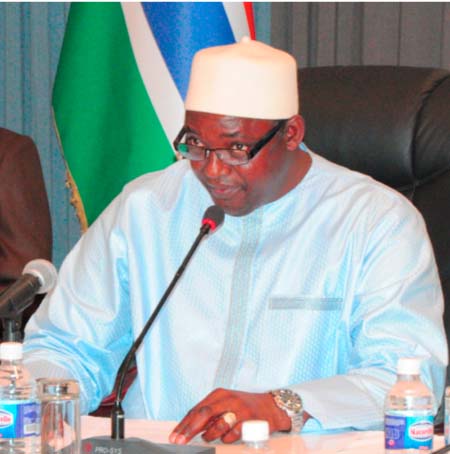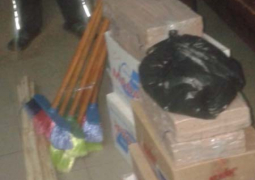
Introduction
It
is with great pride that I stand here today at the Institut des Science
Politiques in Paris to give a lecture on this important theme: The Resolution
of the Crisis and the Major Stages of the Reconstruction of The Gambia”.
Context
on the crisis
To
dilate on the theme, it is important to understand the context in which the
crisis took place. Since its birth as a
republic, The Gambia has never witnessed a democratic transfer of power from
one party or person to another until Coalition 2016 effected the change.
Almost
three decades after independence from British colonial rule, the former
President Yahya Jammeh seized power through a military coup in 1994.
The
former ruling party and its main opponent were banned from contesting. It established a party which gave itself all
the advantages of incumbency so that they could have an edge over all the newly
created political parties to contest in the 1996 presidential election.
The
country went through constitutional reform which gave rise to the 1997 Constitution.
There was attempt to separate the executive from the legislature so that it
could serve as a genuine oversight institution to prevent violation of the
Constitution and abuse of office.
Many
Gambians believed that they were entering a second republic that would
guarantee them more liberty and prosperity.
The
Jammeh administration used the powers to erode the democratic development of
the country by putting other political parties to a disadvantage.
Under
his two decades of rule Gambians had to live with ruthless dictatorship, bad
governance, human rights abuses, bad policy choices, brutality towards its
citizens and the denial of the rule of law.
The death penalty was executed thus leading to a state of fear and
absolute tyranny.
Communities
were threatened that if they fail to vote for the president in presidential
elections they would not receive any support from government. The slogan was
promoted that those who support the opposition do not support development.
Development was linked to support of the ruling party. Both democracy and development was lost.
Such
conduct isolated the country from our friends and deprived us of development
aid.
Our
young people embarked on illegal migration, most of our intellectuals left for
better jobs, businesses closed, media and political freedoms limited.
State
institutions were politicized and state officials engaged in partisan politics,
thus failed to serve the interest of citizens.
All these reflected on the macro economic situation of the country which
had gone to its lowest point.
It
became a crime to exercise our political rights if one supported opposition
parties. We were denied permit to hold
rallies, citizens deprived of the right to demonstrate to show discord with the
system. The citizens became engulfed
with fear. The media was forced to
censor itself. Most people opted for the
social media as an alternative means of expressing themselves, in particular the
young people.
Human
rights abuse such as unlawful arrests, detention without trial, torture,
killings and disappearances of people seen as opponents of the APRC government
were accepted as normal under the Jammeh regime. The circumstances of political victims
including the killing of political activist, Solo Sandeng who died after being
arrested and tortured sparked the political crisis in The Gambia. His only crime was engaging in a
demonstration demanding electoral reforms.
The news of his death resulted to the main opposition party, United
Democratic Party - UDP executive members to march out on the streets demanding
for him dead or alive. All the executive
members who were out making such demand were arrested and jailed.
This
created a political vacuum in the UDP.
On the 1st September 2016, the Party elected me as its flag bearer.
The
population got annoyed but was conscious of the brutal nature of Jammeh’s
leadership. This made the population to
feel helpless but determined to change their condition without bloodshed. This situation coupled with the online
campaign by Gambian Diaspora motivated the political parties to come together.
Despite their different political ideologies, they became bound by their desire
to free the Gambians from the bondage of the Yahya Jammeh rule.
On
the 1st November 2016, we formed The Coalition 2016 consisting of eight
stakeholders (Seven Political parties
and an Independent Presidential Aspirant).
I was elected a Presidential Candidate to contest for the 1st December
2016 election.
To
be a candidate under the Jammeh regime was a big risk. Presidential candidates had to pay half a
million Dalasis, equivalent to ten thousand Euros. This was to make it almost
impossible to have candidates to challenge the incumbent. It was such a scenario that has prompted
Gambians to take the courage to liberate themselves in a non-violent
manner.
The
Coalition 2016 team embarked on a campaign tour as a united front with peaceful
but strong campaign messages. The electorates were enlightened that they had
the power to change the government by exercising their civic right to vote in a
secret ballot. The Gambian Diaspora and
friends of the Gambia got engaged intensively on Social Media as an alternative
means of communication.
On
the 1st December 2016, three candidates contested for the presidency. Gambians went to the polls to bring about a
change they so desired through the ballot box.
They decided to vote for me as President. The Independent Electoral Commission declared
me as the winner of the election.
My
opponents, Mamma Kandeh of the GDC conceded defeat as soon as it was clear that
he had lost. Yahya Jammeh went on
television and conceded defeat as well as congratulated me. The population was pleasantly surprised that
a dictator could concede without a fight.
The world celebrated the decision the Gambians have taken to bring about
a peaceful change of government.
The
political impasse started when to the surprise and disappointment of many,
former President Jammeh went on television to refute the results of the
elections.
He
challenged the Independent Electoral Commission for providing wrong figures in
my favour. This created chaos in the
country, tensions got high, conflict was looming and people were displaced both
internally and externally.
Resolution
of the Crisis
The
official transition programme to ensure peaceful handing over of power was
disrupted. The disruption of the
peaceful transition programme required tact to avoid bloodshed. As President-Elect I received Gambians in
their numbers to show solidarity and to defend their votes before my swearing
in date of 19th January 2017.
It
was the first time professional bodies, Civil Society groups, Community
leaders, religious leaders, women and youths across the country openly showed
support for the change of government.
At
the international level, global leaders, diplomats in and outside the country
reached out to openly congratulate me. Throughout the transition, I maintained
a message of peace and promoted tolerance in my public statements as well as
through the media.
Citizens
were encouraged to respect the stated time I was to be sworn in as President as
provided in the Constitution to promote the rule of law. This was critical because many people were
ignorant of the law and assumed that as President-Elect I should have assumed
power immediately.
Furthermore
it was the first time since 1965 when we attained independence that the Gambia
had experienced handing over power from one democratic government to
another.
The
global goodwill during the transition ensured that there was peace. The focus was on the legality that on the
19th January was the date when all organs of government had to recognize my
presidency. It was an important period
when diplomacy was at its height.
Organization such as ECOWAS, AU, EU and the UN all came together to
render support during the impasse.
There
were high level negotiations led by sub regional heads of states from ECOWAS
and behind the scene diplomacy involving various actors. Military intervention was not ruled out
because the former President insisted on staying in power after Gambians had
decided.
After
several consultations with ECOWAS I took the strategic decision to leave the
country to enable ECOWAS intervention forces to engage in the country.
I
chose to stay in Senegal because of its proximity and our shared cultural
identity of the same people in two different states. Public support was great and Gambians
supported the ECOWAS military intervention to defend their will. Gambians were reassured that their will was
expressed when I was sworn in at the Gambian Embassy in Dakar on the 19th
January 2017. This was the day I legally
became President of the Republic of the Gambia and on the 18th February 2017,
my inauguration took place in The Gambia.
Major
Stages of the Reconstruction of the Gambia
My
government has the task to build a democracy that would give rise to the
respect for fundamental rights and freedoms, rule of law and good
governance. It would require cooperation
with development partners to enhance freedom and prosperity for our people.
The
Gambia needs urgent financial and technical support to safeguard the change we
have fought for to end dictatorship.
This will guarantee Institutional and legal reforms as well as promotion
of human rights and freedom of our citizens can be sustained.
A
Think Tank of experts has been set up to harness our human resource base. Their expertise would be tapped in the
various fields to support the government in its reform agenda.
Reconstruction
of a country which has been destroyed can be challenging. The reforms have already started with the
promotion of human rights. The
political prisoners of conscience were all released and restructuring of the
various institutions are underway. The laws are being reviewed; commissions are
to be set up to review the public enterprises for the necessary reforms to take
effect. The reforms in the security
sector are also ongoing.
My
Government requires timely donor support to implement our National Emergency
Response Plan. The purpose of this plan
is to engage our development partners either financially or technically in
order to put our country on the right socio-economic and political path. This will sustain our development agenda and
promote growth. In essence my vision is
to guarantee the liberty of the people in a gender responsive environment.
We
want to build strong institutions, have laws that will promote the dignity of
the citizens. We want to liberate our
people to engage positively in nation building.
I
would encourage my team to work with genuine investors who will partner with
Gambians, transfer knowledge and build their capacity to sustain
development.
In
conclusion, I want to assure you that the Gambia is back and open to its
friends and donor partners to attain the sustainable development goals. It is when there is justice that there will
be peace and there cannot be justice when the socio-economic and political climate
is not favourable to the citizens.
I thank you for your kind attention.


